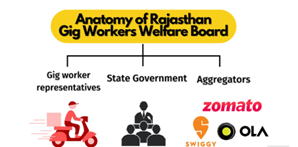A worker by another name.
Relevance
- GS Paper 2 Government policies and interventions.
- Tags: #upsc #rajasthan #gigworkers #gigeconomy #IE
Why in the News?
The Rajasthan Gig and Platform Workers (Registration and Welfare) Act was recently passed by Rajasthan assembly.
For Whom?
The Rajasthan Gig and Platform Workers (Registration and Welfare) Act stands as a pivotal piece of legislation with far-reaching implications.
- This act has its roots in the advent of rideshare cab services like Ola and Uber, which debuted in India around 2010-11. Subsequently, services such as Swiggy for food delivery and Urban Company for various tasks emerged, employing numerous workers across over 250 Indian cities.
- Despite the initial phase of prosperity, marked by venture capital-driven incentives, issues such as meagre wages, customer mistreatment, and lack of rights led gig workers to raise concern.
The Call for Change
- Both central and state governments had been passive observers to these issues. Corporations labeled platform workers as “partners” to evade their responsibilities as employers. Unsurprisingly, these companies failed to share their profits with these “partners.”
- However, the Rajasthan Gig Workers Act redefines this narrative by mandating unique IDs for all platform workers, laying the foundation for future benefits and protection.
Three Pillars of the Act
- Revenue Generation for Welfare: The Act mandates a transaction levy on platform companies, directing the funds towards worker welfare. This fee system addresses the opacity around upfront pricing models and reveals the effective commission rates imposed on transactions.
- Tripartite Welfare Board: The legislation establishes a welfare board comprising government representatives, companies, and workers. This board administers the welfare fund, with a noteworthy aim of countering manipulative unions that favor companies’ interests.
- Data Transparency: A groundbreaking aspect of the Act is the transfer of transaction-level data control from companies to a government-managed database. This move enhances transparency, empowers workers with access to vital data, and curtails misclassification as mere “partners.”
Promises and Imperfections
- While the Act is a step forward, it has its shortcomings. It doesn’t directly address the misclassification of workers or fully dispel ambiguities present in its wording.
- Nevertheless, it introduces elements of transparency and accountability that can transform the gig industry’s dynamics.
Future Prospects and Challenges
- The Rajasthan legislation offers both immediate relief and a promise for the future. By rectifying worker misclassification and introducing mechanisms for grievance redressal, this law creates a foundation for worker empowerment.
- The Indian Federation of App-based Transport Workers, a nascent union, stands to leverage this momentum for further rights and improvements not only in Rajasthan but across the nation.
- Crucial Implementation: The success of the Act hinges on effective implementation. Given the historical defiance of companies like Uber, mobilization of workers, instrumental in the legislation’s creation, must now ensure its enforcement.
- With proper implementation, this legislation can revolutionize the industry. Transaction-level data sharing, grievance resolution commitments, and worker recognition set the stage for sustainable progress.
- The act is a boon for immediate relief and holds the promise of ushering in a new era for gig workers, not just in Rajasthan but across India.
The Rajasthan Gig Workers Act is a beacon of hope for gig workers, setting an example for other states and the central government. While challenges persist, the act’s foundation of transparency, data sharing, and collective empowerment presents an opportunity to reshape the landscape of gig work, making it more equitable and secure.
| Key Features of Rajasthan’s Gig Workers’ Law
Registration of Gig Workers · Mandatory registration of all gig workers under state government supervision. · State government maintains a comprehensive database of gig workers. · Unique IDs assigned to gig workers for tracking employment history and benefits. Access to Social Security Schemes · Gig workers gain access to diverse social security schemes. · Schemes encompass health insurance, accident coverage, and emergency financial aid. Grievance Redressal Mechanism · Guarantees gig workers the right to voice grievances. · Offers a platform for resolving work-related issues and protecting worker rights. Platform-Based Gig Workers Welfare Board · Oversees welfare and rights of gig workers in the state. · Board consists of State officials, gig worker and aggregator representatives, and others. · Ensures at least one-third of nominated members are women for balanced representation. Platform-Based Gig Workers Fund and Welfare Fee · Introduces “Platform-Based Gig Workers Fund and Welfare Fee” to finance social security measures. · Fund supports gig workers with financial aid during challenging circumstances. Fee Levied on Aggregators · Aggregators obligated to pay a transaction fee for each platform-based gig worker engagement. · State government determines fee percentage for welfare fund contribution. Penalties for Non-Compliance · Penalties established for aggregator non-compliance. · Late welfare fee payment incurs 12% per annum interest from due date. · State government empowered to impose fines up to Rs 5 lakh for initial violations and up to Rs 50 lakh for subsequent violations by aggregators. |
Sources: Indian Express, The Hindu, Money Control
Mains Question:
Q “Discuss the key provisions and significance of the Rajasthan Gig Workers’ Law. How does this legislation address the challenges faced by gig workers in the state? Analyze its potential impact on the gig economy and the welfare of workers.”250words.





